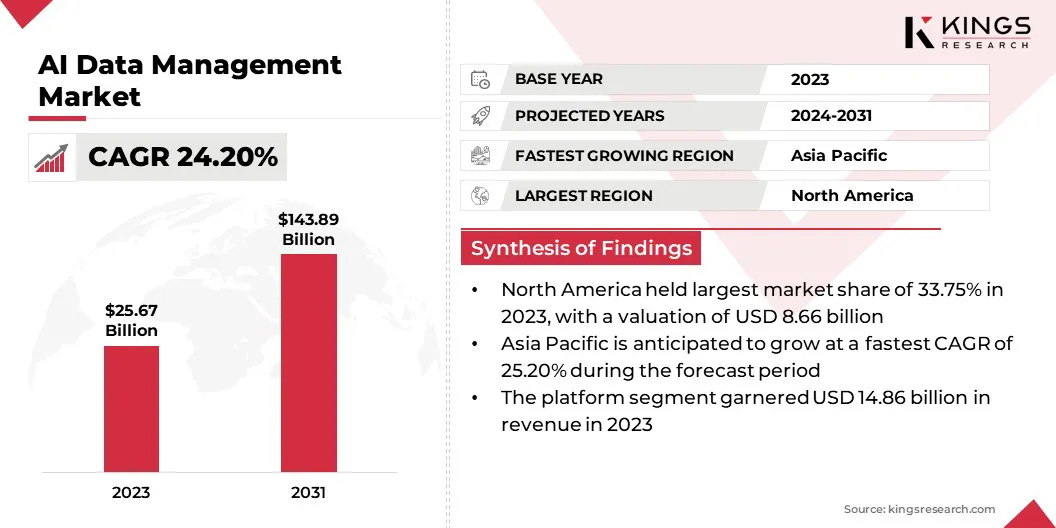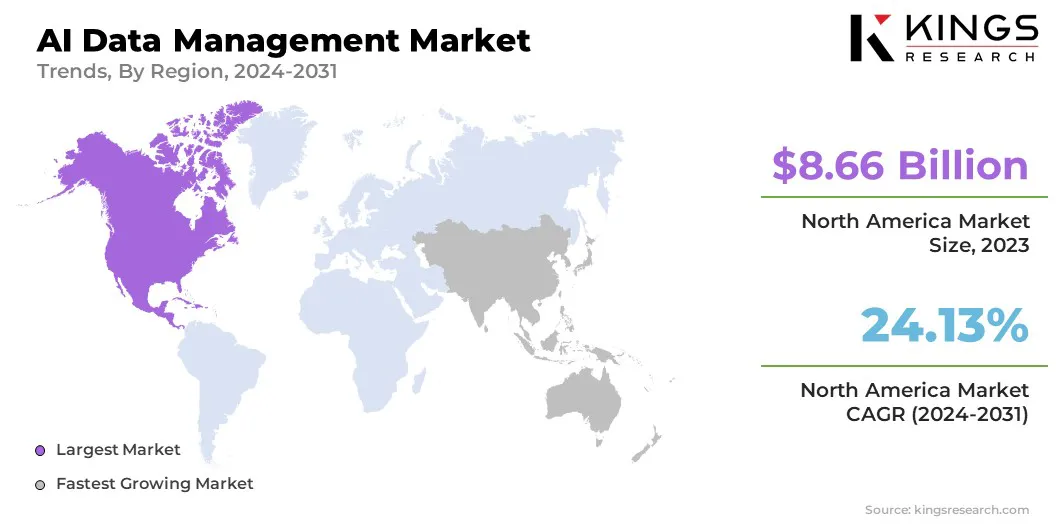ICT-IOT

AI Data Management Market

AI Data Management Market Size, Share, Growth & Industry Analysis, By Offering (Platform, Services), By Deployment (Cloud-based, On-premises), By Application, By Technology (Machine Learning, Natural Language Processing, Computer Vision, Context Awareness), By Vertical, and Regional Analysis, 2024-2031
Pages : 240
Base Year : 2023
Release : March 2025
Report ID: KR1607
Market Definition
The market focuses on the development and implementation of advanced systems that streamline data processing, storage, and governance using Artificial Intelligence (AI). It involves automating data integration, quality control, and security measures to enhance efficiency and accuracy.
AI-driven algorithms optimize data structuring, anomaly detection, and metadata management, ensuring seamless access and retrieval. This market supports applications across industries, including predictive analytics, regulatory compliance, and intelligent automation.
Enterprises leverage AI-powered platforms for data cataloging, knowledge graph generation, and real-time decision-making, reducing manual intervention. The adoption of AI in data management enhances operational intelligence, enabling organizations to extract valuable insights from complex datasets.
AI Data Management Market Overview
The global AI data management market size was valued at USD 25.67 billion in 2023 and is projected to grow from USD 31.56 billion in 2024 to USD 143.89 billion by 2031, exhibiting a CAGR of 24.20% during the forecast period.
The rise in data generation has intensified the demand for advanced AI-powered management solutions that enhance processing efficiency and ensure seamless accessibility. Businesses are increasingly adopting AI-driven automation to streamline data structuring, categorization, and governance, reducing manual effort and improving accuracy, fueling the market.
Additionally, the rising demand for AI-driven business intelligence and analytics is pushing organizations to implement intelligent data management platforms that optimize decision-making and support real-time insights for strategic growth.
Major companies operating in the AI data management industry are IBM, Microsoft, Oracle, SAP SE, Google, Amazon Web Services, Inc., Teradata Corporation, Snowflake Inc., Cloudera, Inc., Databricks Inc., Informatica LLC, SAS Institute Inc., Salesforce, Alteryx, and Hewlett Packard Enterprise Development LP.
The growth in data generation has intensified the demand for advanced management solutions, fueling the market. Businesses are dealing with structured and unstructured data from multiple sources, including IoT devices, cloud applications, and enterprise systems.
AI-driven tools optimize data structuring, automate categorization, and enhance accessibility, ensuring efficient processing at scale. The need for real-time analytics and actionable insights has further accelerated the adoption of AI-powered data management platforms, enabling organizations to extract value from complex datasets while maintaining accuracy, security, and compliance with evolving regulatory requirements.
- In February 2025, SAP introduced SAP Business Data Cloud, a fully managed SaaS solution designed to unify and govern SAP data while seamlessly integrating with third-party data sources. As an advancement of SAP's industry-leading data, planning, and analytics solutions, SAP Business Data Cloud combines SAP Datasphere, SAP Analytics Cloud, and SAP Business Warehouse into a unified platform. This integrated experience enables businesses to gain transformative insights across all operational areas, enhancing data-driven decision-making.
The growing demand for AI-driven data management solutions is driven by the need to unify and govern vast amounts of structured and unstructured data across enterprise systems. Integrating analytics, planning, and data warehousing into a single framework enhances real-time insights and automated data processing, reinforcing the expanding role of AI in managing complex datasets with greater efficiency and compliance.

Key Highlights:
- The AI data management industry size was valued at USD 25.67 billion in 2023.
- The market is projected to grow at a CAGR of 24.20% from 2024 to 2031.
- North America held a market share of 33.75% in 2023, with a valuation of USD 8.66 billion.
- The platform segment garnered USD 14.86 billion in revenue in 2023.
- The cloud-based segment is expected to reach USD 79.74 billion by 2031.
- The data augmentation segment secured the largest revenue share of 24.47% in 2023.
- The computer vision segment is poised for a robust CAGR of 46% through the forecast period.
- The BFSI segment is projected to secured the largest revenue share of 22.40% in 2023.
- The market in Asia Pacific is anticipated to grow at a CAGR of 25.20% during the forecast period.
Market Driver
Adoption of AI-powered Automation in Data Management
Businesses are integrating AI-driven automation into data management workflows to improve efficiency and reduce manual intervention, contributing to the growth of the AI data management market. AI algorithms streamline data ingestion, transformation, and quality checks, minimizing errors and inconsistencies.
Automated metadata tagging, deduplication, and data cataloging enhance discoverability and accessibility across enterprise systems. Machine Learning (ML) models continuously refine data classification and integrity checks, improving operational accuracy.
The shift toward intelligent automation has enabled organizations to allocate resources efficiently while maintaining high data reliability, driving the widespread adoption of AI-based data management solutions.
- In March 2025, AWS introduced Unified Studio in Amazon SageMaker, integrating AI, analytics development, and data management within a single environment. This transformation repositions SageMaker from a ML platform into a comprehensive solution that streamlines data management, analytics, and AI workflows, eliminating the need to transfer data across multiple platforms. By automating data pipelines, the platform ensures seamless information delivery, enhancing AI-driven analytics and decision-making.
Market Challenge
Data Privacy and Security Concerns
Ensuring data privacy and security remains a critical challenge for the growth of the AI data management market. Organizations handle vast volumes of sensitive information, making them vulnerable to breaches, unauthorized access, and compliance risks.
Regulatory frameworks such as General Data Protection Regulation (GDPR), the California Consumer Privacy Act (CCPA), and industry-specific mandates add complexity to data governance.
Companies are implementing AI-driven security solutions, including automated threat detection, encryption, and access control mechanisms.
Additionally, businesses are leveraging federated learning and differential privacy techniques to process data while minimizing exposure risks. Strengthening cybersecurity strategies and adopting zero-trust architectures further enhance data protection and regulatory compliance.
Market Trend
Increasing Reliance on AI-powered Business Intelligence and Analytics
Financial institutions, healthcare providers, and e-commerce companies are increasingly leveraging AI-powered data management to enhance decision-making and competitive intelligence, boosting the market.
AI-driven analytics platforms process large datasets, identify patterns, and generate predictive insights, enabling businesses to optimize operations and improve customer experiences. Advanced AI models refine data visualization, trend forecasting, and sentiment analysis, helping enterprises gain a deeper understanding of market dynamics.
AI-powered data lakes and warehouses facilitate real-time reporting and strategic planning. The integration of AI with business intelligence tools has transformed enterprise data utilization, creating growth opportunities for AI-based data management solutions.
- In September 2024, Oracle introduced new AI-powered features for Oracle Fusion Data Intelligence, designed to help organizations maximize the value of their data assets and strengthen their competitive position in an analytics-driven business environment. The latest enhancements include intelligent applications for Oracle Fusion Cloud Human Capital Management (HCM) and Oracle Fusion Cloud Supply Chain & Manufacturing (SCM), extending beyond conventional analytics to provide actionable recommendations within essential daily workflows.
AI Data Management Market Report Snapshot
|
Segmentation |
Details |
|
By Offering |
Platform, Services |
|
By Deployment |
Cloud-based, On-premises |
|
By Application |
Data Augmentation, Data Anonymization & Compression, Exploratory Data Analysis, Imputation Predictive Modeling, Data validation & Noise Reduction, Process Automation, Others |
|
By Technology |
Machine Learning, Natural Language Processing, Computer Vision, Context Awareness |
|
By Vertical |
BFSI, Government & Defense, Healthcare, Manufacturing, Energy & Utilities, IT & Telecommunications, Others |
|
By Region |
North America: U.S., Canada, Mexico |
|
Europe: France, UK, Spain, Germany, Italy, Russia, Rest of Europe |
|
|
Asia-Pacific: China, Japan, India, Australia, ASEAN, South Korea, Rest of Asia-Pacific |
|
|
Middle East & Africa: Turkey, UAE, Saudi Arabia, South Africa, Rest of Middle East & Africa |
|
|
South America: Brazil, Argentina, Rest of South America |
Market Segmentation:
- By Offering (Platform and Services): The platform segment earned USD 14.86 billion in 2023, due to its comprehensive capabilities in data integration, processing, and governance, enabling enterprises to streamline workflows, enhance scalability, and optimize AI-driven analytics within a unified ecosystem.
- By Deployment (Cloud-based and On-premises): The cloud-based segment held 54.42% share of the market in 2023, due to its scalability, cost efficiency, and seamless integration with AI-driven analytics, enabling enterprises to process and manage large datasets with enhanced flexibility and real-time accessibility.
- By Application (Data Augmentation, Data Anonymization & Compression, Exploratory Data Analysis, Imputation Predictive Modeling, Data validation & Noise Reduction, Process Automation, and Others): The data augmentation segment is projected to reach USD 35.34 billion by 2031, owing to its critical role in enhancing model training by generating diverse, high-quality datasets, improving algorithm accuracy, and addressing data limitations across industries.
- By Technology (Machine Learning, Natural Language Processing, Computer Vision, and Context Awareness): The computer vision segment is poised for significant growth at a CAGR of 24.46% through the forecast period, due to its ability to efficiently process, analyze, and extract actionable insights from vast volumes of unstructured visual data, driving adoption across industries such as healthcare, retail, and autonomous systems.
- By Vertical (BFSI, Government & Defense, Healthcare, Manufacturing, Energy & Utilities, IT & Telecommunications, and Others): The BFSI segment is expected to hold 22.40% share of the market share in 2031, due to the increasing adoption of AI-driven risk assessment, fraud detection, and regulatory compliance solutions, enabling financial institutions to enhance decision-making, automate data governance, and optimize customer analytics.
AI Data Management Market Regional Analysis
Based on region, the global market has been classified into North America, Europe, Asia Pacific, Middle East & Africa, and Latin America.

North America accounted for a market share of around 33.75% in 2023, with a valuation of USD 8.66 billion. The AI data management market in the region is expanding, due to the widespread adoption of AI-powered cloud platforms by enterprises seeking scalable and secure data solutions.
Leading cloud providers, including AWS, Microsoft Azure, and Google Cloud, are integrating AI-driven automation into their data management services, enhancing real-time processing and analytics capabilities. Businesses are leveraging these solutions to manage vast datasets across hybrid and multi-cloud environments, optimizing workflows and decision-making.
The increasing reliance on AI-enabled cloud platforms for data governance, security, and compliance has strengthened the adoption of AI-driven data management across industries.
Additionally, the healthcare sector in North America is increasingly relying on AI-driven data management solutions to improve patient care, research, and regulatory compliance. Hospitals, pharmaceutical companies, and life sciences organizations are utilizing AI-powered platforms to manage Electronic Health Records (EHRs), clinical trial data, and genomic information.
AI enhances data interoperability, automates medical coding, and ensures real-time insights for diagnostics and personalized treatment. The rapid expansion of telemedicine and digital health services has further driven the need for AI-driven data integration and security solutions, enabling healthcare providers to manage sensitive data with higher efficiency and regulatory adherence.
- In October 2024, Microsoft introduced innovations within Microsoft Cloud for Healthcare to enhance care experiences, improve team collaboration, support healthcare professionals, and provide actionable clinical and operational insights. These advancements include enhanced data management capabilities in Microsoft Fabric and an AI-driven nursing workflow solution. With the general availability of healthcare data solutions in Microsoft Fabric, organizations can streamline data access, management, and utilization through a unified AI-powered platform. Microsoft Purview now offers healthcare security application templates in public preview to strengthen data governance.
The market in Asia Pacific is poised for significant growth at a robust CAGR of 25.20% over the forecast period. The financial sector in Asia Pacific is registering a surge in AI adoption for data management, particularly in banking, insurance, and fintech, boosting the AI data management industry.
Institutions in China, Singapore, and Australia are deploying AI-driven platforms to manage high-frequency trading data, automate risk analysis, and enhance fraud detection. AI-powered data management solutions are optimizing compliance with evolving regulations such as Singapore’s Financial Services and Markets Act and Australia’s Consumer Data Right (CDR).
The rapid expansion of digital banking and mobile payment ecosystems is further increasing the demand for AI-driven data governance and security solutions to handle vast transactional data volumes efficiently.
Furthermore, the manufacturing sector in Asia Pacific is increasingly adopting AI-driven data management to optimize production efficiency and supply chain operations. China, Japan, and India are leading the adoption of AI-powered predictive maintenance, quality control, and logistics automation.
AI-driven platforms analyze real-time data from industrial IoT sensors and Enterprise Resource Planning (ERP) systems to enhance decision-making and minimize downtime.
The rapid growth of e-commerce and global trade has further intensified the demand for AI-powered supply chain analytics, helping companies navigate disruptions, improve demand forecasting, and enhance inventory management across complex distribution networks.
Regulatory Frameworks
- The U.S. adopts a sector-specific approach to AI regulation, emphasizing guidelines over comprehensive legislation. Federal agencies like the Federal Trade Commission (FTC) provide guidance on AI ethics and data privacy. The National Institute of Standards and Technology (NIST) has developed the AI Risk Management Framework to promote trustworthy AI systems. Additionally, the U.S. has implemented export controls on advanced AI chips and semiconductor technologies to maintain national security interests.
- The EU has introduced the Artificial Intelligence Act (AI Act), the world's first comprehensive AI law, aiming to ensure that AI systems are safe, transparent, and respect fundamental rights. The AI Act received a favorable vote from the European Parliament on March 13, 2024 and will be fully applicable around June 2026 following a two-year grace period.
- China has implemented several regulations impacting AI development and use, including the Administrative Provisions on Recommendation Algorithms in Internet-based Information Services (2021) and the Administrative Provisions on Deep Synthesis in Internet-based Information Services (2022). These regulations form the foundational legal framework for AI governance in China at this stage.
Competitive Landscape:
The AI data management industry is characterized by several market players that are strengthening their position by developing advanced data cloud solutions and forming strategic collaborations with industry partners to enhance data integration, governance, and AI-driven analytics.
These initiatives are enabling organizations to unify structured and unstructured data, optimize real-time processing, and improve decision-making capabilities. Companies are leveraging partnerships to expand their technological capabilities, integrate ML frameworks, and support AI-driven automation in data management.
Businesses are driving innovation in AI-powered data platforms, reinforcing market expansion, and addressing the growing demand for secure, scalable, and intelligent data solutions by aligning their strategies with evolving enterprise needs.
- In February 2025, SAP SE introduced SAP Business Data Cloud, a transformative solution designed to integrate SAP and third-party data across organizations, ensuring a trusted foundation for data-driven decision-making and AI advancements. This platform streamlines data from essential business applications while incorporating advanced data engineering and analytics capabilities to drive innovation and actionable insights. The solution seamlessly integrates Databricks technology, enhancing support for data engineering, ML, and AI workloads.
List of Key Companies in AI Data Management Market:
- IBM
- Microsoft
- Oracle
- SAP SE
- Amazon Web Services, Inc.
- Teradata Corporation
- Snowflake Inc.
- Cloudera, Inc.
- Databricks Inc.
- Informatica LLC
- SAS Institute Inc.
- Salesforce
- Alteryx
- Hewlett Packard Enterprise Development LP
Recent Developments (M&A/Partnerships/Collaboration/Agreements/Product Launch)
- In March 2025, Google Cloud announced a definitive agreement to acquire Wiz, aiming to expand security solutions for businesses and government entities. This collaboration is set to enhance cybersecurity offerings, providing organizations with greater flexibility in safeguarding their digital environments. Integrating Wiz’s capabilities wil help Google Security Operations strengthen its ability to collect security telemetry data, apply advanced threat intelligence, and identify high-priority risks. Additionally, the platform will facilitate automated incident response, case management, and seamless collaboration, ensuring comprehensive protection for modern IT infrastructures.
- In March 2025, Oracle and NVIDIA announced a partnership to integrate NVIDIA’s accelerated computing and inference software with Oracle’s AI infrastructure and generative AI services, enabling organizations to accelerate the development of agentic AI applications. Through this collaboration, Oracle Cloud Infrastructure (OCI) now natively supports the NVIDIA AI Enterprise software platform, offering access to over 160 AI tools and 100+ NVIDIA NIM microservices directly through the OCI Console. This integration delivers a comprehensive AI stack designed to address key requirements such as data privacy, sovereign AI, and low-latency processing.
- In March 2025, IBM announced new collaborations with NVIDIA, including planned integrations leveraging the NVIDIA AI Data Platform reference design to help enterprises optimize data utilization for building, scaling, and managing generative AI workloads and agentic AI applications. IBM's newly introduced content-aware storage (CAS) capability enables organizations to extract insights from vast volumes of unstructured data for inferencing while maintaining trust and security.
- In February 2025, IBM acquired DataStax, a key provider of AI and data solutions, to strengthen its watsonx portfolio and accelerate the adoption of generative AI. This acquisition enables businesses to derive greater value from extensive unstructured data while reinforcing IBM’s commitment to open-source AI. DataStax brings key technologies, including AstraDB and DataStax Enterprise, which offer NoSQL and vector database capabilities, as well as Langflow, an open-source platform supporting low-code AI application development.
CHOOSE LICENCE TYPE
CUSTOMIZATION OFFERED
Additional Company Profiles
Additional Countries
Cross Segment Analysis
Regional Market Dynamics
Country-Level Trend Analysis
Competitive Landscape Customization
Extended Forecast Years
Historical Data Up to 5 Years
